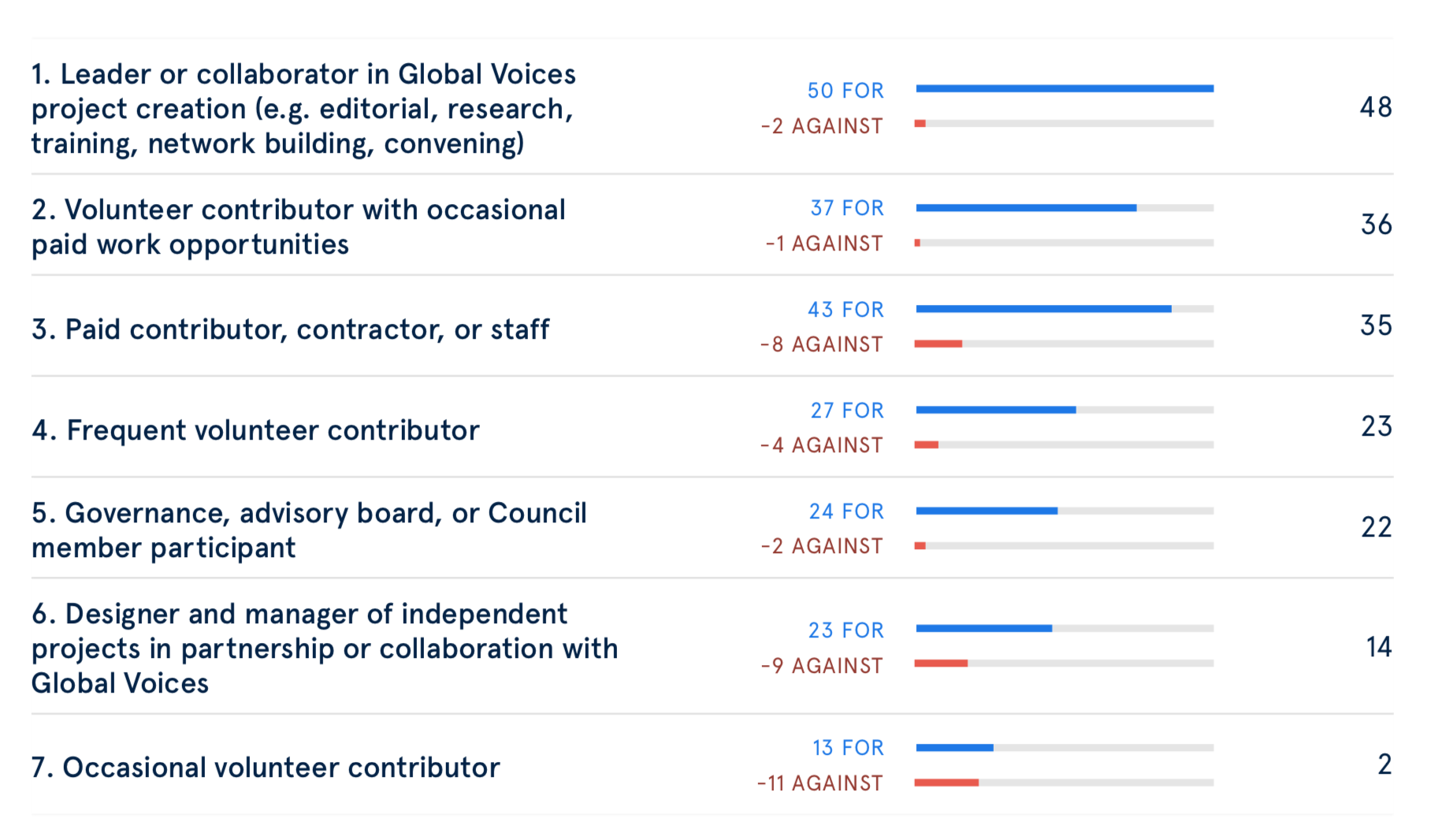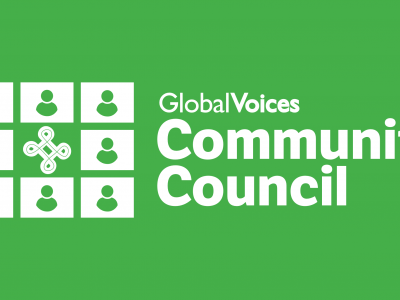This year’s poll explored Council members’ preferences and ideas for community incentives and benefits, to ensure that members of the GV community are supported and empowered and remain motivated.
Full poll results are available in this recent post. In this post, we’ll discuss the implications of the results, and also look at the anonymized free text responses, which are available in a public spreadsheet.
The poll comprised five questions arising out of the 2023 Issue Paper, which detailed the benefits people gain from participating in GV, the incentives offered to contributors, and the possibility of offering more or different options. The poll looked at possible motivations including: benefits and incentives for newsroom contributors, media training opportunities, community clubs and conversations, and building/modeling the social media of the future.
This year we asked multiple choice questions that gave respondents the opportunity to select all options that interested them, and also provided space for free text responses in order to capture alternative ideas from participants.
Section 1: Benefits and incentives
This section of the poll asked respondents to consider their overall relationship to the benefits and incentives that motivate their participation in Global Voices activities.
Eighty-seven percent of the respondents chose “being a part of a global network of writers, translators, researchers and activists.” This was the most popular option by a significant margin, and accords with many previous polls and questions about overall motivations for participation: contributors derive significant benefit from participation in a global community, and the networks and relationships that come out of that community.
The second most popular option, “improving your skills, knowledge and work experience, was selected by 73 percent of respondents. This is a significant shift: in previous polls Global Voices contributors have usually indicated less interest in self-improvement as a motivation, highlighting instead a desire to change the way their communities are represented in media. For example, in 2018 Community Council poll questions about the values that motivate participation, the “personal development of community members” was of little interest to most respondents, and some were actively opposed to this as a value. Likewise, teaching and training skills were not a popular choice, and the idea of Global Voices as an “open learning” community received little support.
The third most popular incentive: having a “platform to share information about your community/country,” with 69 percent approval, is similar to the most important value for contributors’ participation from 2018: “amplification of the voices and stories of underrepresented and misrepresented communities.”
The 75 free-text responses to the accompanying question “What motivates you to participate in the Global Voices community?” are a joy to read. There are too many wonderful quotes to reproduce here, but a strong example is:
“I really love to be part of this diverse, supporting, caring, noisy and sometimes chaotic community, that responds as one body when any of us is suffering.”
Section 2: Restructuring newsroom benefits and incentives
Eighty-one percent of respondents chose “Expanding initiatives such as co-productions, paid research and writing opportunities, and fellowship programs.” This option highlights opportunities to participate in part-time and focused projects alongside other activities. As a preference it matches earlier poll questions such as “which roles would you most like to have with Global Voices,” in which the top response was “leader or collaborator in GV project creation (e.g. editorial, research, training, network building, convening).”

From 2018 poll on degrees of professionalism in Global Voices. Results for the question: What roles would you most like to have with Global Voices?
Interestingly, the least popular options were about Global Voices doing less overall: “review and amendment of editors’ work obligations” and “reducing publication targets for editors.” While we might revise editorial team obligations as a result of this Council, we should be mindful that the Council in general is not in favor of GV producing less, but rather in working differently.
The accompanying free-text responses to this question tease out nuance about the mixing of volunteer and paid activities, including concern that Global Voices be very clear about who has access to paid activities, and why; numerous points about the challenges of sustaining a paid mechanism; and increased opportunities for people who are unable to volunteer their time.
Section 3: Media training
Media training is hugely popular in this poll: 89% responded that it is important or very important, with 67% saying that it is very important. This result marks a significant shift in priorities from earlier polls, and merits a serious response and consideration about restructuring our activities in order to ensure more opportunities for training and learning.
It’s notable that a lot of Global Voices activities do already involve informal learning, such as intensive editorial support, but we do not often formally designate this work as training. Some reconfiguration of existing projects may allow us to create learning opportunities with our existing resources. In other cases we will need to design new projects or raise more funds.
“It's a clearly defined incentive that could attract new contributors, especially in regions where recruiting people has been hard.”
In the free-text responses, we find many ideas about risks and concerns about how to do training well. A general takeaway here is that it’s not enough to offer training; we need to identify Global Voices’ particular strengths, and also not try to compete with platforms that offer general journalism education.
All of the suggested types of media training are popular with respondents, with media literacy and narrative analysis—the core function of the Civic Media Observatory—leading the way.
Section 4: Community Clubs and Conversations
Community clubs were generally popular with respondents, with 57 percent of respondents likely or very likely to participate. Attributes that are most attractive include openness to all contributors and the idea that discussions could lead organically to actions. The form and process by which clubs are formed and maintained are less interesting to respondents, though those elements are essential to maintaining successful clubs over time. This suggests, perhaps, that clubs will need committed leaders to facilitate conversations.
In the free-text responses we saw many comments focusing on positive attributes: increasing connectivity within the GV network, building relationships across regions and languages, encouraging collaboration and creating unstructured spaces to generate ideas. Risks include time constraints, language considerations, and worries about the labor of managing and coordinating groups.
Section 5: Building/modeling the social media of the future
Council members were very enthusiastic about the idea of GV social media initiatives, meaning projects that engage publics through social media spaces. Seventy-three percent indicated they are interested or very interested in the idea, and 71 percent are definitely or possibly interested in participating. While GVers, in many contexts, have expressed considerable frustration with existing social media platforms, the idea of a GV-oriented social platform or even channel appears to be appealing. Once again, the value of a transnational, multilingual network rose to the top as a key motivator for participation. Interestingly, a social media network with explicit GV values is less important to respondents.
Comments on this topic were also rich, and somewhat more cautious than the response to the related poll questions would suggest. Positive effects include the expansion of GV-facilitated conversations in public, a positive influence on social media trends, community building, contributor motivation, and the introduction and promotion of GV’s culture to new communities. Concerns include platform dependency, cost of building and maintaining either channels or technologies, a crowded market for technologies, the possibility of increased tensions or polarization, and effects on digital safety.
Conclusion
Overall, the poll sends a strong message that GV Council members gain real benefit from participating in a transnational, multilingual network. Respondents, generally, expressed enthusiasm for finding ways to expand that network to new communities. They want to see us continue to offer contributors meaningful experiences and relationships. They are excited about possibilities for learning new skills and gaining new knowledge. They are also interested in opportunities for project-based paid research, writing, and media production, even as many continue to value the volunteer contributions that they can offer, in the service of Global Voices’ mission.

